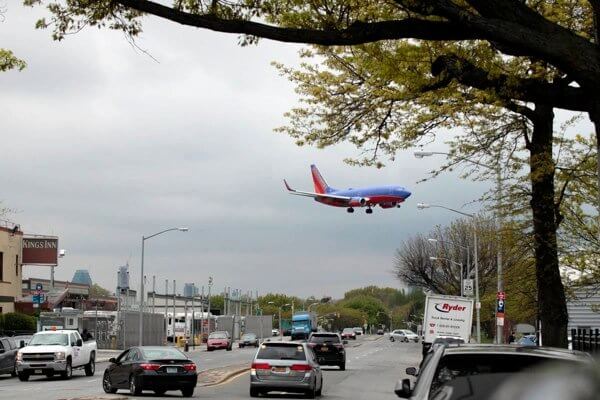By Carlotta Mohamed
U.S. Rep. Grace Meng (D-Flushing) is continuing her fight against the disturbance of aircraft noise in Queens.
The congresswoman sent a letter to U.S. Transportation Secretary Elaine Chao Sept. 6 to eliminate LaGuardia Airport’s noisy TNNIS Climb, a controversial flight pattern over Queens that negatively impacts the health of borough residents, according to a new study.
The study, “The Trade-Off between Optimizing Flight Patterns and Human Health: A Case Study of Aircraft Noise in Queens, NY, USA,” was published Aug. 15 in the recent edition of the International Journal of Environmental Research and Public Health.
According to the study, Next Gen is an automated flight system that uses GPS, data from other flights, and atmospheric conditions to optimize flight patterns. Its changes in flight patterns have the potential to reduce pollution, flight time, costs and accidents.
However, it can also cause serious health concerns, as Meng outlined in her letter its destruction of her constituents’ quality of life and leading to premature deaths, according to the study.
“The route has unfairly burdened our borough with blistering aircraft noise ever since it was implemented by the FAA in 2012, and this study confirms our suspicions about the adverse health impacts of combating the excessive airplane noise over Queens,” said Meng. “In America 2018, this should not be happening. There are alternative routes, some of which were regularly relied upon as recently as this decade.”
Meng said she hopes that Chao will consider reviewing and eliminating the use of the TNNIS Climb flight path to provide her constituents the relief they desperately need.
According to the study, the TNNIS Climb was historically used during the US Open tennis tournament in Flushing Meadows Corona Park adjacent to LaGuardia Airport, where runway 13 has become a common route of departure.
As a result of the jet engines disrupting the matches, flights were instead diverted over densely populated residential neighborhoods in Queens – consisting of mainly Community Boards 7 and 11 – producing large increases in aircraft noise, the study said.
Additionally, high levels of exposure to aircraft noise has been linked to the development of serious physical and mental health conditions such as Cardiovascular Disease and anxiety, the study said.
According to the report, the Port Authority of New York and New Jersey measured the average day and night levels of noise affecting Queens communities outlining areas exposed to 55+, 60+, 70+, and 75+ decibels (dB) DNL. The allowable limit in the United States is 65 dB.
In her letter to Chao, Meng said it is likely that limiting the use of the TNNIS Climb flight path would be cost-effective relative to its year-round use.
“Doing so would prevent much more disease at a much lower cost than commonly used clinical health prevention modalities, such as colon cancer screening or mammography,” said Meng. “We did not attempt to add further cost savings from productivity or other spillover effects for people on ground, such as future lost tax revenue, social service consumption, and crime costs associated with lower educational attainment.”
Meng is requesting a release of results and underlying data generated from the National Aircraft Annoyance Survey.
In addition, the congresswoman wants community representatives to become a part of the Next Gen Advisory Committee (NAC), and notice of information about relevant upcoming meetings at which the issue will be discussed.
Reach reporter Carlotta Mohamed by e-mail at cmoha




































